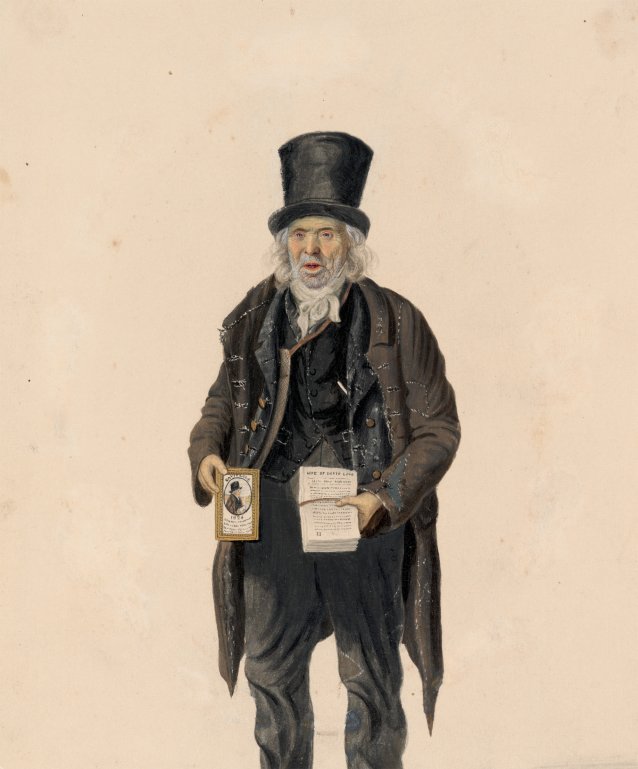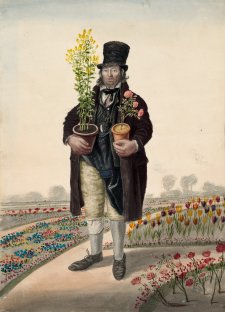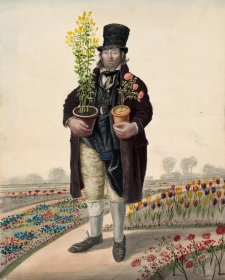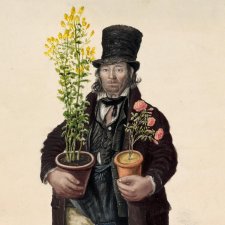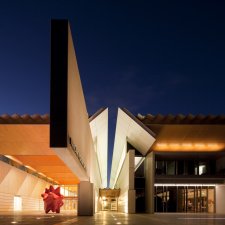The life of David Love, the Nottingham Poet, was long and full, and was detailed by the man himself in an autobiography that runs to nearly 200 pages and went through five editions.
Born in Torriburn, near Edinburgh, in 1750, Love began his life in beggary, his mother having first been abandoned by his father and then gone blind during the boy’s infancy. In his youth, David began work as a travelling bookseller, a ‘walking’ or ‘flying stationer’, before a chance encounter with a stepbrother led to his going down the coal mines at Culross. After breaking his arm in a pit accident, he left the colliery and taught for a while at a village school, where he first began writing songs and verses.
Selling these doggerel ballads proved to be more profitable than teaching, so Love took to the pack again, travelling throughout Scotland. He married Mary Thompson, briefly managed a shop, and then went back to hawking but, around 1780, he took the poor man’s option of the King’s shilling, enlisting in the Duke of Buccleuch’s regiment, the ‘South Fencibles’, for three years.
The lame arm proving grounds for discharge, he then worked for a printer in Gosport before returning to the trade of flying stationer, he and his wife leading a peripatetic existence between Scotland, London, Bristol and the road. In 1796 Love underwent a conversion to Christianity and, for the rest of his life, his verses, hymns and acrostics (and his autobiography) oscillated between a grim and gritty vernacular realism and a hopeful evangelical faith. Mary died in Rugby in 1804, and Love moved to Leicester, then to Nottingham, where he met his second wife, Mary Falconer (also née Thompson). The couple married in Derbyshire before moving to York and to Newcastle-upon-Tyne. But, in 1809, this Mary too died, also in Rugby, also at the age of 50, prompting the widower to write the following verse:
In this vain world my troubles still abound,
My two wives lie in Rugby’s burial ground;
Both of one name, and both of them one age,
And in one house both were call’d off the stage.
Returning to Nottingham the following year, Love met and married his third wife, a widow named Elizabeth Laming. After the frame-breaking riots of 1812, the family moved up to Scotland for a year before returning to Nottingham. Now with two small children, and still struggling, David and Elizabeth spent several months in the St Mary’s Workhouse in 1814. When Elizabeth was pregnant with their fourth child, the parish Overseers of the Poor pressured the family to return to David’s native Scotland. Instead, they moved to London. Although he ‘there found more kindness, love and tenderness than any place in England’, life was still very hard: ‘We paid three shillings each week for rent, and all the winter sixpence a peck for coals; for potatoes we paid a halfpenny a pound, and bread ninepence-halfpenny a quarter [loaf], so that for rent, fire, candles and soap, it took six shillings each week, and we found it often hard to keep out of debt.’
So once again, and for the last time, the Loves returned to Nottingham, where David lived out the last five years of his life crying and selling his verses, and the book of his Life, adventures and experience, until his death in 1827. Love’s autobiographical narrative is an exhausting read in its account of grinding poverty, of constant travel, hunger, illnesses and injuries, of births and deaths, of legal battles and even occasional imprisonments. Just as wearing, though, is the author’s irrepressible optimism, his simple acceptance of the flying stationer’s lot:
And David Love is full of talk,
When he his books about doth hawk;
As he of Money has much need,
These verses buy that you may read.
Collection: Tasmanian Museum and Art Gallery, presented by C. Docker, 1956
